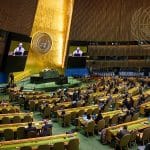The June 2018 Prespes Agreement, which settled the so-called Name Dispute with newly-renamed North Macedonia, Greece’s northern neighbor, was an important but not the leading issue in the Greek parliamentary election campaign, except in Northern Greece where the ruling SYRIZA party had previously received a broad thumbs down by the electorate in the 26 May Euro-elections. While still a major concern, Greek voters heard less about foreign policy and more about economic issues such as high taxation and job creation in the run-up to the 7 July Greek parliamentary elections.
Except for several days in June when the issue of Turkish exploratory drilling in areas near Cyprus or possibly in the Aegean was front and centre, foreign policy generally was given a lower profile in the campaign than economic concerns, especially since the majority of the Greek population has seen little evidence of Greece’s slow-motion economic recovery, and SYRIZA’s poor handling of economic policy was the focus of many election debates.
Ironically, SYRIZA has spent considerable time and effort running campaign spots on Greek TV highlighting deceptive claims by various New Democracy officials concerning the Prespes Agreement, with the main point being former Prime Minister Kostas Karamanlis’ apparent willingness to accept a vastly inferior deal in regards to the country’s international name in 2005. SYRIZA used the same tactic it employed in the January 2019 debate over the ratification of the Prespes Agreement, unearthing and publishing previously classified documents from the Greek Foreign Ministry archive.
Campaign over
The “snap” parliamentary election campaign in Greece that unexpectedly followed the broad public rejection of Prime Minister Alexi Tsipras’ SYRIZA party in the 26 May European elections has ended. The final public opinion polls place main opposition party New Democracy led by Kyriakos Mitsotakis in the clear lead with an 8-10 point margin over SYRIZA, with substantial prospects for New Democracy gaining enough seats to form a single-party government under the current Greek election system which awards the party winning a plurality of votes overall a 50 seat bonus in Greece’s 300 seat Parliament.
Skopje remains quiet
Another reason the Prespes Agreement was not the lead issue in the campaign was the recognition by North Macedonian Prime Minister Zoran Zaev that anything newsworthy he might say or do involving Greece could be twisted by the media and the various opposition parties. Accordingly, he focused on domestic issues like the 27 June government reshuffle where he temporarily took control of his own Ministry of Finance.
There is still no indication that the Zaev government has any kind of strategy to reach out to the next Greek government which will be mindful of Zaev’s strong and continuing support for Tsipras. There has been no mention of any Zaev plans to return Tsipras’ well-publicised April visit to Skopje where a number of bilateral agreements were hurriedly signed. There has also been media speculation that Zaev, when visiting his summer residence in the Halkidiki area south of Thessaloniki, has been holding some secret meetings, most notably with US Ambassador Geoffrey Pyatt who was reportedly seen in the area the same day.
How quickly will Washington play its hand?
Time will be needed for the incoming ND-led government to organize itself but on the foreign affairs front, there will be little time to spare. Most observers expect New Democracy’s experienced “shadow foreign minister” and former MEP George Koumoutsakos to formally assume the role of Foreign Minister. It is practically guaranteed there will be a flood of visitors to Athens starting in July even though Mitsotakis himself is a known and respected quantity in world capitals.
There is little question the Trump Administration will dispatch a high-level emissary to Greece almost immediately to establish contacts with the new government in Athens above the standard ambassadorial-level pleasantries, but the real question is whether the designated US visitor will beat the new Greek Foreign Minister to Washington.
In any event, the incoming Greek government will not agree with Washington on the so-called benefits of the Prespes Agreement which New Democracy repeatedly voted against and tension over this issue should be expected, especially if the Greek side lives up to Mitsotakis’ promises over the past year to try to obtain the concessions from Skopje that any other Greek government but Tsipras would have demanded. We should expect additional tension with Washington if the new Greek government temporarily freezes the bilateral relationship with Skopje or orders any kind of review of Prespes commitments, which is highly likely.
This will all be happening in the context of ongoing preparations for the annual UN General Assembly meetings in New York in September. It is expected the incoming PM will plan to make a strong showing in New York, and likely will add side visits to Washington and other US cities that he already knows well to begin pressing for more US investment in Greece.
As the agenda for the September side meetings in New York begins to firm up, we will have a clearer idea what kind of interaction with US President Donald J. Trump will be arranged for the new Greek PM. This will, of course, depend on the State Department and National Security Council’s assessment of the situation in regard to Turkey, Cyprus, the Aegean as well as regional energy questions, also including developments in Southeastern Europe, all of which would routinely be squeezed into a meeting with the US President if organised.
The UN might also offer to sponsor a meeting of the signatories to the Prespes Agreement in order to keep the new Greek government on track.
There is no question that planning for these kinds of meetings will begin both in the US Government and the United Nations as soon as the new Greek government is named if they have not already been pencilled in. It is also possible that Washington’s congratulatory message to the 7 July election victor will include references to such future encounters.
The Name Dispute after the July 7 Greek elections
Economic policy surpassed the Name Dispute as a campaign issue
- Advertisement -
- Advertisement -







